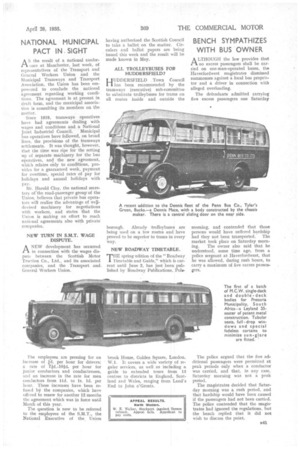NATIONAL MUNICIPAL PACT IN . SIGHT A s the result of a national confer
Page 59

If you've noticed an error in this article please click here to report it so we can fix it.
ence at Manchester, last week, of representatives of the Transport and General Workers Union and the Municipal Tramways and Transport Association, the Union has been empowered to conclude the national agreement regarding working conditions. The agreement is at present in draft form, and the municipal association is consulting its members on the matter.
Since 1919, tramways operatives have had agreements dealing with wages and conditions and a National Joint Industrial Council. Municipal bus operatives have followed, on broad lines, the provisions of the tramways settlements. It was thought, however, that the time was ripe for the setting up of separate machinery for the bus operatives, and the new agreement, which relates only to conditions, provides for a guaranteed week, payment for overtime, special rates of pay for holidays and annual holidays with pay.
Mr. Harold Clay, the national secretary orthe road-passenger groupof the Union, believes that private bus operators will realize the advantage of welldevised machinery for negotiations with workers, and states that the Union is making an effort to reach national agreements also with private companies.
NEW TURN IN S.M.T. WAGE DISPUTE.
ANEW development has occurred in connection with the wages dispute between the Scottish Motor Traction Co., Ltd., and its associated companies, and the Transport and. General Workers Union.
The employees are pressing for an increase of id. per hour for drivers; a rate of 'Td,-104d. per hour for junior conductors and conductresses, and an increase in the rate for men conductors from 11d, to Is. Id. per hour. These increases have been refused bit the companies, which have offered to renew for another 12 months the agreement which was in force until March of this year.
The question is now to be referred to the employees of the S.M.T., the National Executive of the Union having authorized the Scottish Council to take a ballot on the matter. Circulars and ballot papers are being issued this week and the result will be made known in May.
ALL TROLLEYBUSES FOR HUDDERSFIELD?
HUDDERSFIELD Town Council has been recommended by the tramways (executive) sub-committee to substitute trolleylauses for trams on all routes inside and outside the
borough. Already trolleybuses are being used on a few routes and have proved to be superior to trains in every way.
NEW ROADWAY TIMETABLE.
THE spring edition of the "Roadway Timetable and Guide," which is current until June 2, has just been published by Roadway Publications, Pols
brook House, Golden Square, London, W.1. It covers a wide variety of regular services, as well as including a guide to extended tours from 13 centres to districts in England, Scotland and Wales, ranging from Land's End to John o'Groats.
BENCH SYMPATHIZES WITH BUS 'OWNER
A LTHOUGH the law provides that 1—% no excess passengers shall be carried on one-man-operated buses, the Haverfordwest magistrates dismissed summonses against a local bus proprietor and a driver in connection with alleged overloading.
The defendants admitted carrying five excess passengers one Saturday morning, and contended that those persons would have suffered hardship had they not been transported. The market took place on Saturday morn ing. The owner also said that he understood, some time ago, from a police sergeant at Haverfordwest, that he was allowed, during rush hours, to carry a maximum of five excess passengers.
The police argued that the five additional passengers were permitted at peak periods only when a conductor was carried, and that, in any case. Saturday morning was not a peak period.
The magistrates decided that Saturday morning was a rush period, and that hardship would have been caused if the passengers had not been carried. The police contended that the magistrates had ignored the regulations, but the bench replied that it did not wish to discuss the point.




































































































